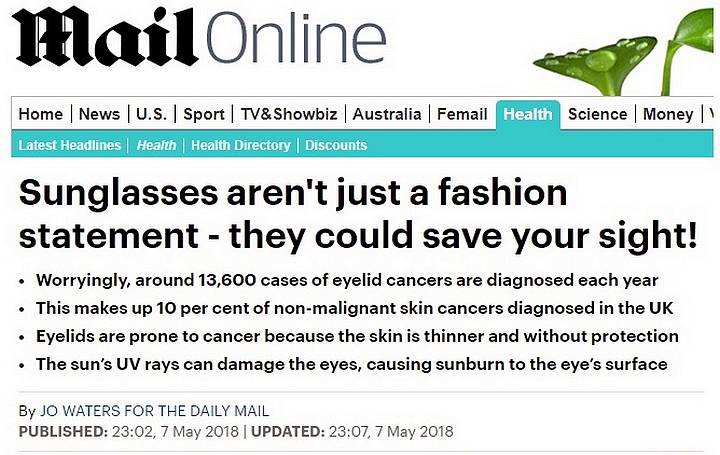 The Mail ran an article on a growing issue for a generation which led holidaying in the sun. A Skin Care Network patient provided their case study, with comments from our consultant.
The Mail ran an article on a growing issue for a generation which led holidaying in the sun. A Skin Care Network patient provided their case study, with comments from our consultant.
Treating any part of our skin affected by cancer requires care, rarely more so than with the periocular region (around the eyes). A sensitive, vital area and one with a fairly high incidence of skin cancer.
Although other areas, including the eyes themselves can be at risk, eyelid cancer is the most common. This amounts to over 5% of all skin cancers, with the lower eyelid a prime contender, the upper eyelid and medial canthus (inner corner of the eye) can also be affected.
A range of cells can become cancerous, in the outer and inner layers of your skin (epidermis and dermis) or cells in hair follicles, or oil and sweat glands. They all require specialist skin cancer care.
Whilst melanomas can occur around the eye and tend to spread, the majority of cases are non melanoma. However, the nature of local tissue and connections around the eye cause a higher than usual risk of non melanoma cancers spreading.
Diagnosing Eyelid Cancer
The symptoms of eyelid cancer and other periocular cancers vary from person to person. You may have a mole which has changed shape, begun to bleed, or become an irritant, a growth, sore, ulcer, or red spot.
They can arise for non cancerous reasons, or might be tell tale signs. The important need is to know which is the case and we will arrange for you to see a consultant with thorough knowledge of the periocular region.
Their skill and experience, along with state of the art diagnostic equipment provide detailed answers. We hope they offer good news, although if there is a problem of any type, immediate treatment is available.
Eyelid Cancer Treatment
We refer to eyelid cancer treatment as this is the most common but our London clinics treat all areas and skin conditions around the eye. An experienced, multi-disciplinary team, offering patients all round care.
This ensures your eyelid cancer, or other conditions will be addressed. Our policy of minimum intervention and maximum cosmetic care is always at the centre of decisions.
Superficial and precancerous lesions can be treated with immune modulating, topical drugs. Radiation therapy may be used to treat certain types of aggressive eye cancers, or in addition to surgery.
A good proportion of eyelid cancer treatment will however be kept to surgery and this is likely to be required. Complete removal of periocular skin cancers is essential in reducing recurrence and to prevent spread to other parts of the body.
Whilst a normal surgical approach could be used, we almost always follow the path of Mohs surgery. Skin Care Network have respected Mohs surgeons in house, with experience of surgery around the eye and eyelid.
Mohs surgery is built on the principle of minimal intervention, with high cure rates and prevention of recurrence, along with reduced cosmetic damage.
Reconstructive Surgery
Where treating eyelid cancer brings a need for cosmetic surgery, this can be effectively carried out. Dedicated techniques help to maintain eye function and appearance.
Surgery could range from carefully stitching the edges of wounds together, to skin grafts, such as a “lid sharing” operation. In each case, performed by a surgeon used to the unique, mobile skin around our eyes.
Their skill protects the eye and helps ensure a good cosmetic outcome. Appearance is critical following any skin cancer treatment, more so for the region in the centre of our face.
Our Care For Eyelid Cancer
Skin Care Network offer eyelid cancer treatment in London, along with in depth diagnosis and treatment for all skin cancers around the eye.
Our consultant dermatologists experienced in Mohs surgery may be involved, or others with dedicated knowledge. The level of professionalism they offer is matched by our facilities and the support given to patients at our London clinic.
If you wish to arrange a consultation, or to simply talk through any issues relating to eye, or eyelid cancer diagnosis and treatment, we will be pleased to help in any way we can.
You may find the options below useful:
- Save time with an intuitive search on: Skin Cancer Diagnosis & Treatment.
- Up to date news, research and insights: Our Dedicated Skin Cancer Blog.
For any advice, or to arrange a dermatology appointment, call 020 8441 1043, or send an email via the Make An Appointment button below.
